Gambling, crypto eclipse stocks as Nigerians turn away from traditional investing
Nigeria’s investment landscape is undergoing a dramatic shift, as new figures from the Securities and Exchange Commission (SEC) reveal that cryptocurrency and gambling have eclipsed traditional stock market participation, underscoring a growing distrust in conventional investment channels.
Between July 2023 and June 2024, Nigeria’s cryptocurrency market recorded transactions worth $50 billion, according to Emomotimi Agama, SEC director-general.
The surge, he noted, starkly contrasts with the stagnation in the country’s formal capital market, where fewer than 4 percent of Nigerian adults are active investors.
Speaking at the annual conference of the Chartered Institute of Stockbrokers (CIS), Agama described the imbalance as alarming, warning that the country’s capital formation goals are being undermined by the exodus of potential investors toward speculative and high-risk alternatives.
Read also: Financial literacy crucial to avert investment risk – Awirigwe
“While fewer than three million Nigerians participate in the capital market, more than 60 million engage daily in gambling activities,” Agama said, adding that Nigerians spend an estimated $5.5 million every day on betting platforms.
“This pattern reflects a deep cultural and economic shift away from long-term value creation toward instant gratification,” he added.
The SEC chief said the rise of crypto trading highlights both the sophistication and risk appetite of a younger generation of investors who are largely disconnected from the traditional capital market.
For many Nigerians, he noted, digital assets and online gaming offer quicker access, fewer bureaucratic hurdles, and a perception of higher returns compared to the slow-moving equities market.
Nigeria’s stock market, despite listing some of Africa’s largest corporations, remains shallow relative to the size of the economy. The country’s market capitalisation-to-GDP ratio stands at about 30 percent, far below emerging market peers such as South Africa and Malaysia.
The trend underscores a crisis of confidence in Nigeria’s financial institutions and a growing preference for decentralised or alternative income streams.
Read also: Global Regulations and the Public Debate Over the Online Gambling Boom
The SEC has been pushing for reforms under its Capital Market Master Plan 2015–2025, aimed at broadening retail participation, improving investor education, and deepening market liquidity.
Still, Agama cautioned that without renewed trust and accessibility, Nigeria risks losing a generation of potential investors to unregulated platforms.
“Our challenge is not just to regulate, but to reinvent. We must create a capital market that inspires confidence, competes with innovation, and rewards patience over speculation,” he said.
As cryptocurrencies and gambling continue to attract millions of Nigerians, the SEC’s warning underscores a broader economic reality: the formal market is struggling to keep pace with a digital and risk-seeking populace that increasingly prefers the thrill of the next bet to the promise of long-term investment.

